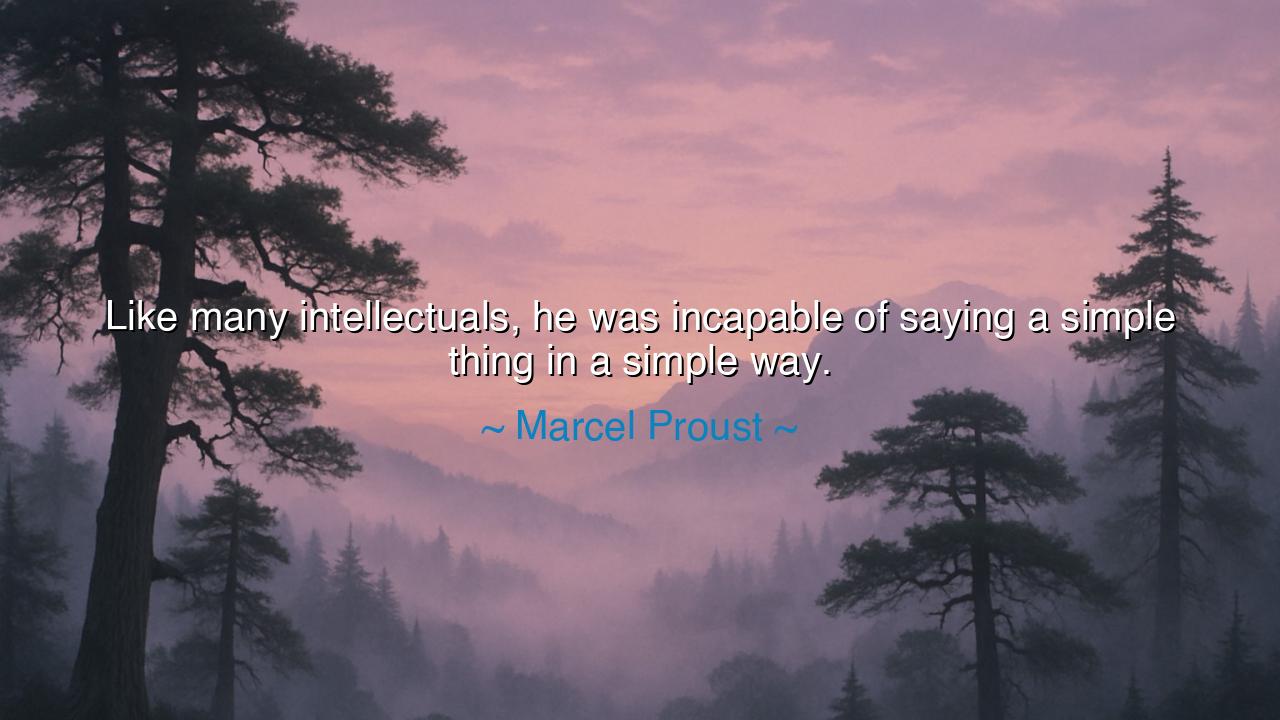
Like many intellectuals, he was incapable of saying a simple






In the golden twilight of thought and memory, Marcel Proust, the delicate observer of the human soul, once wrote with a sigh both tender and amused: “Like many intellectuals, he was incapable of saying a simple thing in a simple way.” These words, though gentle in tone, pierce with quiet truth. They reveal the great paradox of the intellectual mind—that in seeking depth, it often loses clarity; in striving for brilliance, it sometimes forgets beauty. Proust, who himself wrote with the infinite precision of an artist dissecting a dream, knew well the temptation of complexity. His words are both a confession and a warning: that true wisdom lies not in ornamented speech, but in simplicity, which is the highest form of understanding.
The origin of this quote can be traced to Proust’s monumental work, In Search of Lost Time (À la recherche du temps perdu), that vast cathedral of reflection in which he examined love, art, society, and memory with almost supernatural detail. Living among the cultured elite of early twentieth-century France, Proust was surrounded by scholars, critics, and thinkers who prided themselves on elaborate speech. Their words were like gilded mirrors—beautiful, but reflective only of themselves. Proust, in his quiet irony, observed that such intellectuals often clouded truth beneath layers of language. They were masters of obscurity, yet prisoners of their own sophistication. To him, the ability to speak plainly was not a sign of ignorance, but of mastery — for the greatest minds, he believed, make complexity simple, while the lesser minds make simplicity complex.
Simplicity, in Proust’s eyes, was the essence of truth. He understood that language is a vessel, meant to carry meaning — not to bury it. To say “a simple thing in a simple way” is to respect the listener, to honor the truth one seeks to convey. The intellectual who hides behind intricate phrasing does so often out of fear — fear of being ordinary, fear of being understood too easily, fear of revealing the simplicity of truth itself. Yet simplicity is not the absence of depth; it is the expression of depth made clear. As the ancients taught, clarity is the garment of wisdom, while obscurity is the cloak of vanity.
Consider Socrates, the wisest of the Greeks. He never spoke in the language of scholars or kings, but in the tongue of the people. His questions were simple, yet his simplicity shattered falsehoods and awakened nations. When he said, “Know thyself,” he uttered a phrase of two words, but within them lay a lifetime of philosophy. His strength was not in complexity, but in clarity — in the ability to reveal profound truths with the ease of sunlight breaking through clouds. Such simplicity is not weakness, but the mark of a mind that has conquered confusion.
In contrast, history is filled with those who mistook complexity for greatness. Think of certain philosophers whose words built labyrinths rather than bridges, whose writings were admired but rarely understood. Their ideas became towers of Babel — magnificent but empty, reaching toward heaven while failing to touch the heart of man. Proust’s observation is not cruelty but compassion; it is a reminder that intellect divorced from humility becomes noise. The wise do not seek to dazzle, but to illuminate. They know that the purpose of knowledge is communication, not concealment.
There is also a quiet tenderness in Proust’s remark, for he speaks not as an accuser, but as one who understands the struggle of expression. He himself was a man of profound sensitivity, haunted by the endless subtleties of life. His own sentences, vast and winding, were not acts of arrogance, but of devotion — his attempt to capture the infinite in words. Yet even he, the artist of intricacy, recognized that true genius lies in restraint. When he said that the intellectual “could not say a simple thing in a simple way,” he was lamenting the tragedy of brilliance without balance — the inability to let thought breathe.
The lesson, then, is one of humility and clarity. Speak not to impress, but to express. Seek not to sound profound, but to be understood. The greatest truths in life — love, faith, courage, compassion — require no decoration. They are already radiant in their simplicity. The wise man polishes his words not to make them glitter, but to let them shine with truth.
So, my children of intellect and wonder, remember this: let your speech be simple, and your thought be deep. Do not weave words to prove your cleverness, but to share your understanding. The mind that truly grasps truth no longer needs to adorn it. As Proust teaches, the highest form of intelligence is not to complicate what is clear, but to bring clarity to what is complex. Speak with honesty, think with purity, and let your words be like light — gentle, direct, and illuminating to all who hear them.






AAdministratorAdministrator
Welcome, honored guests. Please leave a comment, we will respond soon